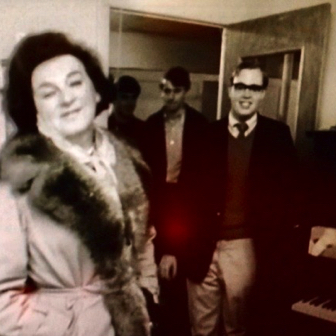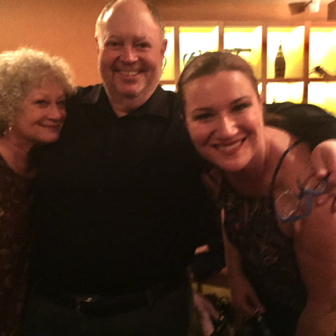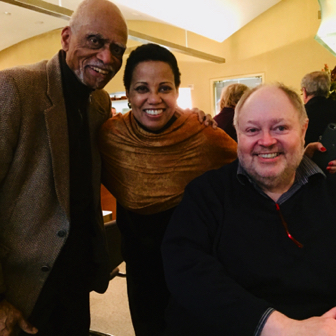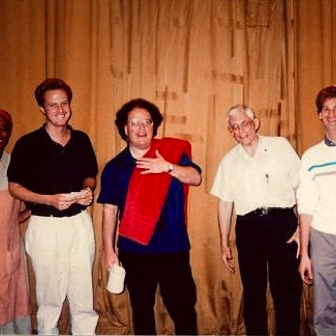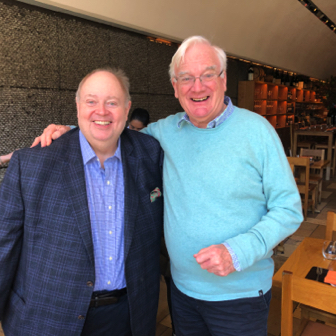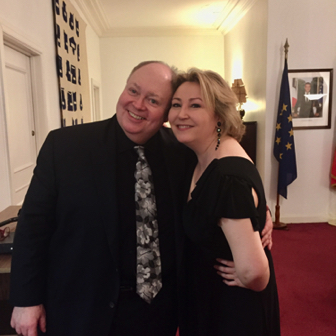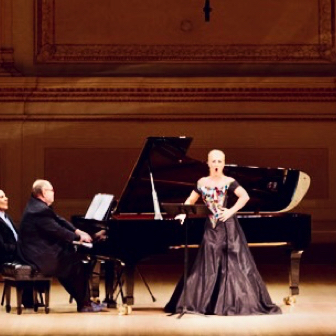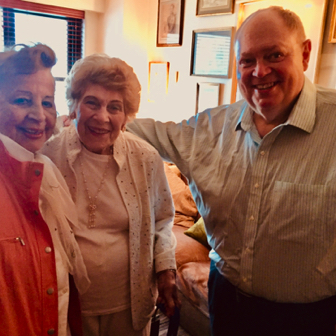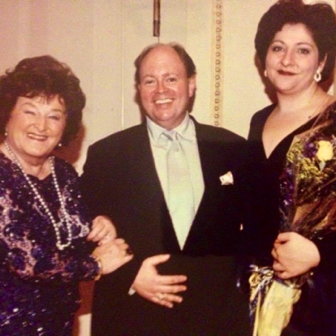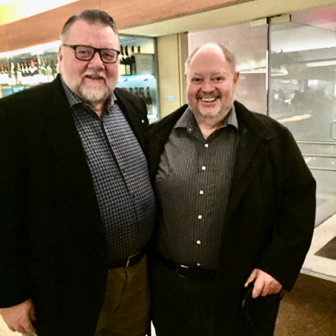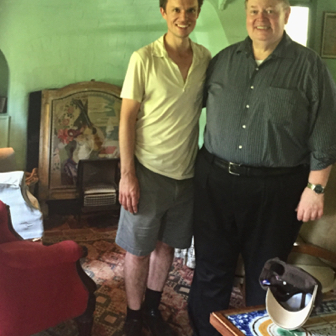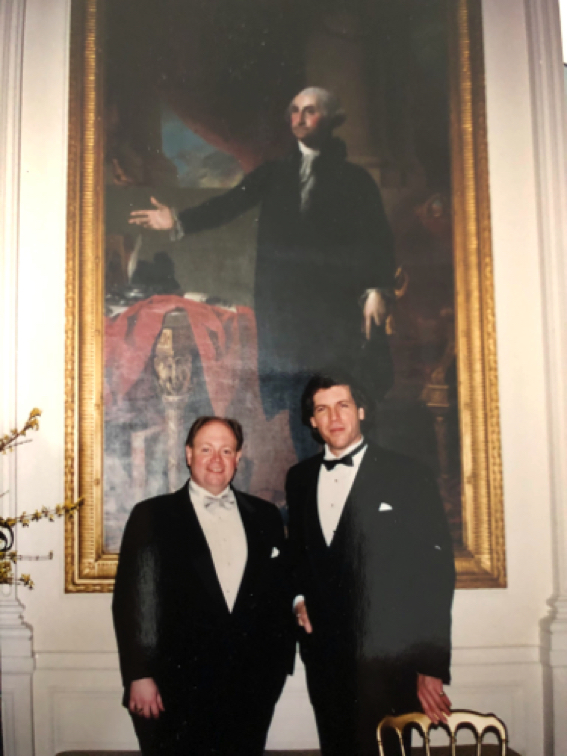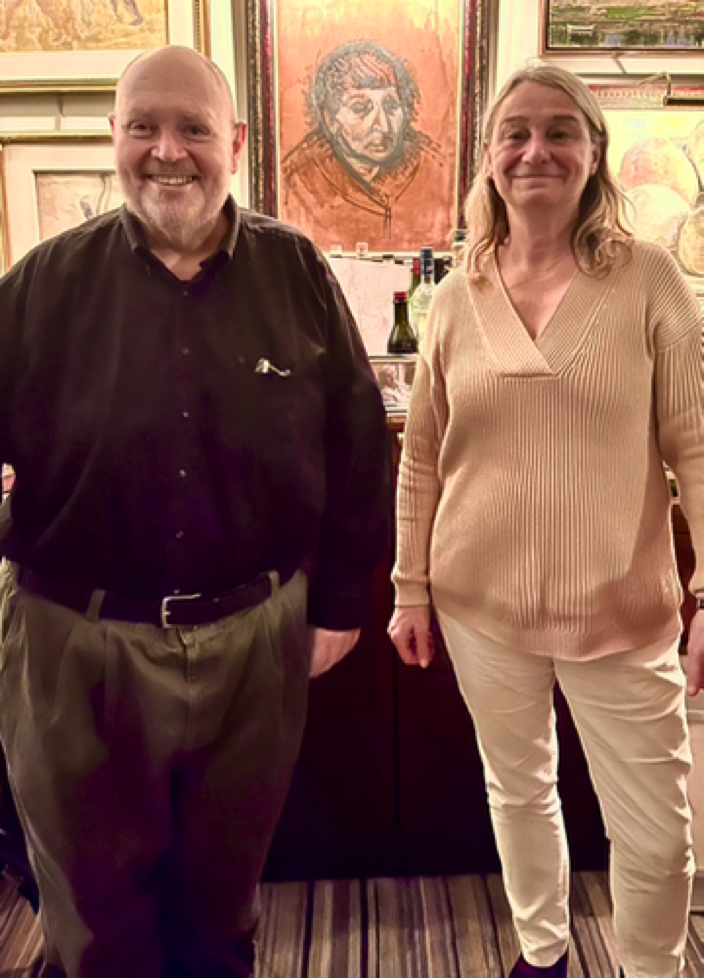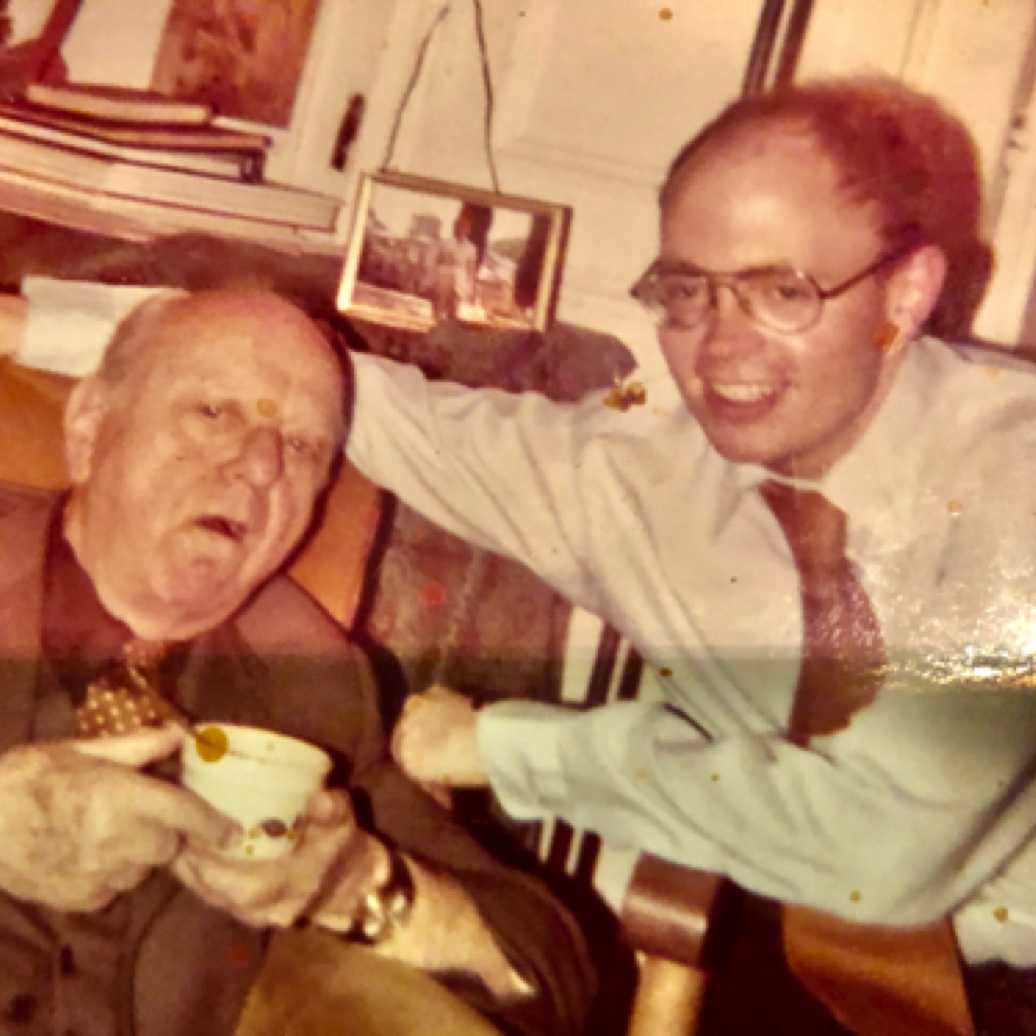
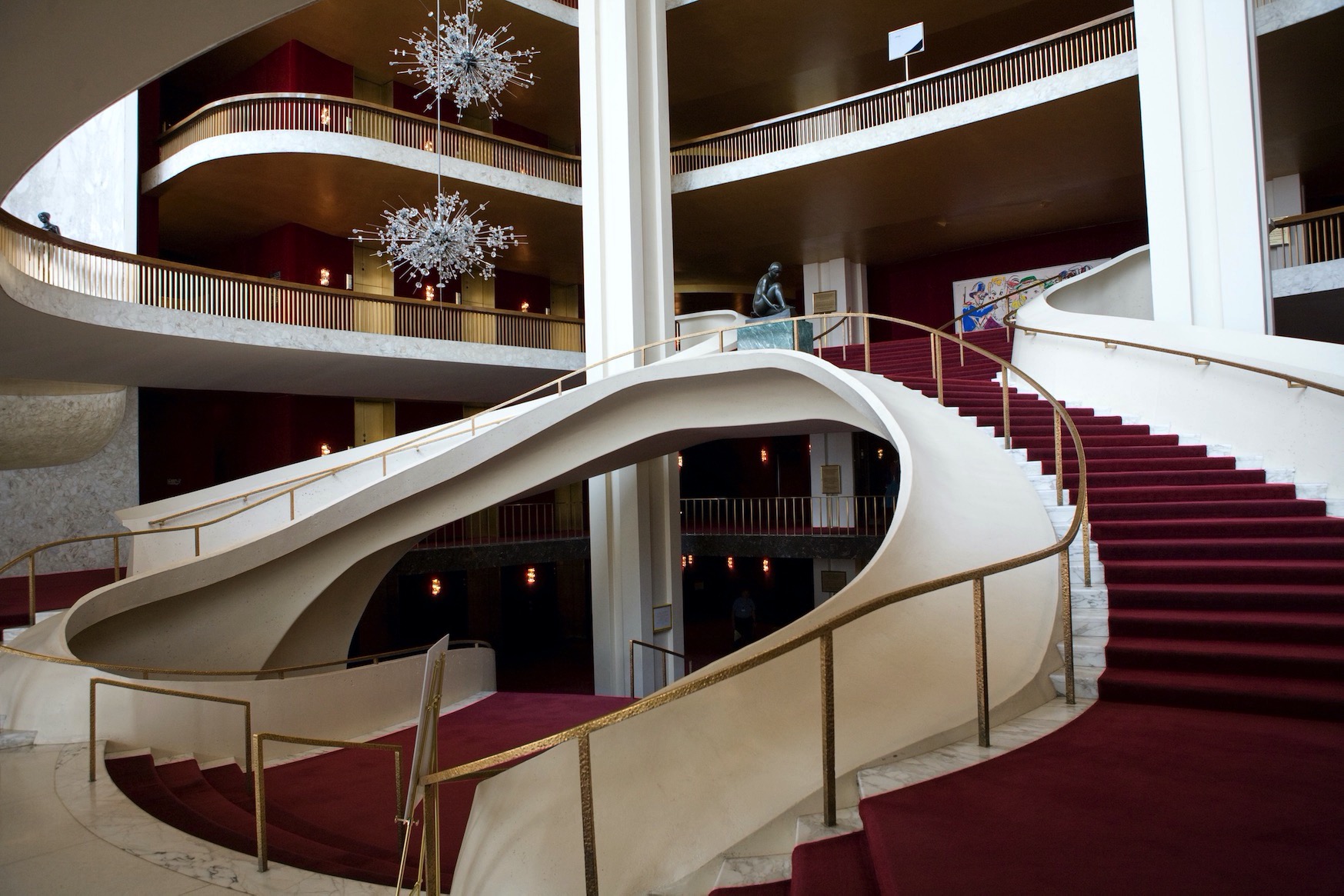
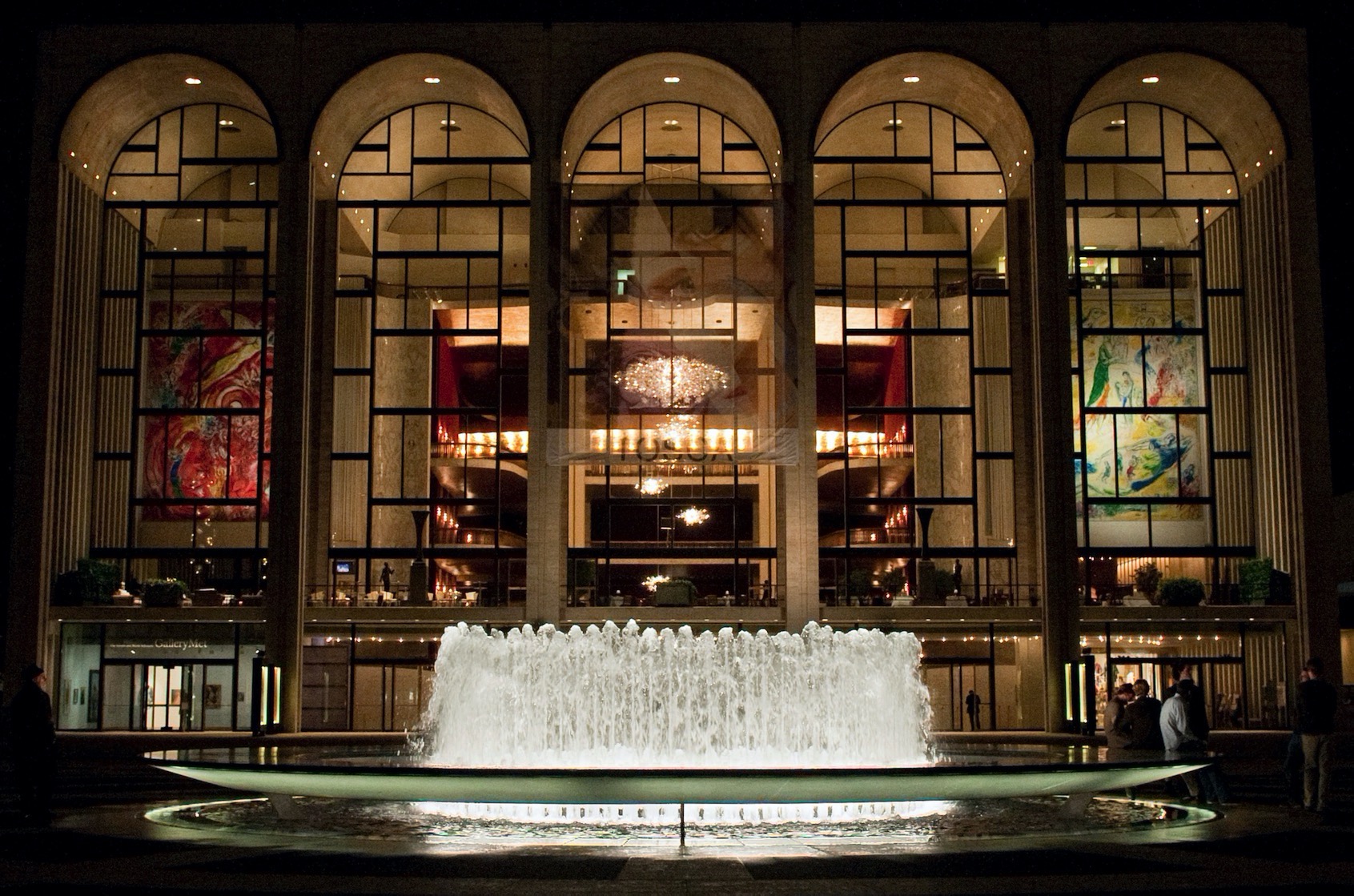
MFL: There is another fascinating phase after you left the MET, which is the one when you traveled to Saint Petersburg regularly to go and work with the young singers at the Mariinsky. Please tell me how that came to be?
CR: Max Rutenberg, my paternal grandfather, was born in Russia and came to US in the late 19th century
I always wanted to go to Russia. In the 70s, France wanted to send me to accompany French singers at the Tchaikovsky competition, but could not obtain a visa… After the MET, I went to Russia for a few weeks with Dominic Armstrong, Suzanne Vinnik and Reginald Smith Jr. Walking on the streets there felt like home immediately. Body language and mannerisms seemed very familiar, like my family, except they spoke Russian! Not Yiddish or English.
Later, back home, Heidi Melton, with whom I had done a recital, asked if I could work with her on the Immolation scene, which she was performing with Gergiev at Carnegie Hall. I went and sat in rehearsals, gave notes, and made musical suggestions. Gergiev was very happy to see me, and he was welcoming of all my musical ideas. The following week, Gergiev spoke with me about a young singer who was going to sing in Tosca with Guleghina, but who was behind in his preparation, and needed lots of help, and in-depth musical preparation. He asked me if I wanted/would come to Russia and coach the singer. I said, “Sure, when?” and Gergiev said, “Tomorrow.” I said, “In a week or two?” I coached the young singer five hours/day to prepare him to be ready to sing with Guleghina. Following this, I was invited to travel to the Mariinsky on a regular basis to provide some coachings for the singers. Veronica Atkins had funded a program at the Mariinsky for young singers, and I started to work there regularly.
I LOVED being there and felt completely in my element, as if I had found the last missing piece of the puzzle of my roots. People had the same blood. I felt closely connected to their deep passion for music, their joy, their fears and their paranoia.
Once the war broke out, and they could no longer pay me I continued to work with the young singers in Russia and felt their profound sadness and challenges. In the midst of all this, during the war, opera, concerts and ballets continue to perform, and performances are sold out. The burning passion for the arts is resilient there.
I believe my insatiable passion for music, love of the arts, joie de vivre, and optimism come from this part of my background.
MFL: Craig, I know you have been to many, many places in the world, but are there any places that are still on your wish list?
CR: Egypt and Bora Bora…
I asked Craig what books he was reading:
CR: My Queer War by James Lord: American GI, upper middle class, friend of Picasso and Giacometti, a closeted homosexual in the Second World War; Shades of Green by John Sales: a gorgeous book on gardening, re-reading Music Chronicles 1940-1954 by Virgil Thomson.
MFL: Words of wisdom for young musicians, singers, all aspiring artists?
ƒ: Never stop studying and reviewing. Always look as far as possible in the past, to get closer to the source of the material, and intentions.
Henry James said - also quoted by Virginia Woolf in her final diary entries - “Observe, perpetually observe”.
There was an old team of house singers at the MET when I arrived. They created something with their artistry and their camaraderie which doesn’t exist anywhere anymore: Andrea Velis, Loretta Di Franco, Ariel Bybee, Morley Meredith, Tony Laciura. They represented for me the old MET. They were still around when I got there.
Recital partners: I was very, very lucky. Thomas Hampson, Ben Heppner, Susanne Mentzer, Jose Van Dam, Christine Brewer, Diana Damrau, Christine Goerke, Joyce Castle…
MFL: Conductors with whom you’ve particularly enjoyed working with?
CR: Georg Solti, Karl Böhm, Horst Stein, Sylvain Cambreling, Bernard Haitink, James Levine, Charles Dutoit, Jeffrey Tate, Marco Armiliato, Simon Rattle, and, last but certainly not least, Fabio Luisi.
MFL: Are there colleagues that you may have particularly enjoyed, all over the world?
CR: In Paris, Madame Reiss. Not that I was comfortable around her, but she was very supportive of me, and I appreciated that beyond words since I was a nobody. Also, an exceptional pianist and coach, Madame Anne-Marie Fontaine, of the Opéra de Paris. The real stuff started at Glyndebourne because the music staff was headed by Martin Isepp. Martin was my immediate boss and overseer. There was the fabulous Jean Mallandaine, a very large English woman, who could play anything and was brilliant at getting singers who were late in preparation, in form. I learned a great deal: it took me a while, but I learned a lot from her and her methods. And it was there that I met Jane Glover, cover conducting Haitink, and assistant chorus master of the Glyndebourne chorus. Those were colleagues very early on in my career. Jean Mallandaine was also head of the music staff in Houston. And Jean and John De Main offered me a job in Houston in September of 1980. My father had just been diagnosed with lung cancer, and I thought it might be a good idea to head back to the States, much as I didn’t want to. So, I came back and I lived in Houston. Houston was a great company in those days: Plácido, Mirella Freni, Bruscantini and also Paolo Montarsolo came twice. Just sitting there in rehearsal, watching them in recitativo!
Carlisle Floyd was on faculty at the University of Houston; he was still writing operas, and we were performing them. It was an amazing time those six years in Houston, because of the quality of the work. The opera studio had fabulous, fabulous young singers. Erie Mills and Eric Halvorson, Bruce Ford, Greer Grimsley, Susanne Mentzer, Stella Zambalis, Diane Kesling, all of whom went off to the MET eventually. The standard was very high.
It was also during that time that AIDS broke out upon us, and I thought I had to do something. I didn’t know what I could do to help, but I knew I had to do something to be useful in the gay community. Just then, in 1982, I met my therapist, a very, very clever great guy, called Bryan Guiot, who was a big popular therapist in the gay community in Houston. He had talked a rich older gay gentleman into signing over one of his houses in Montrose to the gay community, because at that time everyone was so afraid: the hospitals were barely taking in patients with AIDS. They certainly weren’t keeping patients who were going to die soon, and morticians wouldn’t even bury them. It was awful. Bryan created a house for guys who had no place to go.
At that time, I had gone back to school to study some psychology, because I always wanted to study something other than music. I was turning thirty, my father died on my thirtieth birthday. I was going through one of those periods when you look for a change in life. David Gockley, who was running the Houston opera at the time, very kindly allowed me to go back to school, if it didn’t interfere with my daily coachings or evening rehearsals. He was a pretty great guy. So, I started doing my field work with these guys. Several of us took the night shifts where we’d stay up all night, in case a guy needed to be changed; I also cooked for them. We were about twenty people all together who kept this house running for a couple of years.
It’s the only time in my life when I felt useful, really useful to the human race. That went on until Christmas time 1985. I was home-coaching Phyllis Treigle (daughter of Norman Treigle), who was in the Houston studio. I was working out of my house, and the phone rang. It was Ray Quinn, who used to run the rehearsal department at The MET. He said, “We’ve heard about you,” and “Would you be interested in coming up and working?” And I thought on the spot, “Well if I should die young, I will always be very angry that I didn’t the chance to go to the MET.” And he asked if I was coming to New York any time soon. Actually, I was going to see Virgil for a few days, and going to see my mother in Connecticut. I said I could be there in ten days. We set an appointment.
I went to Virgil’s, went off to The MET and came back with a job. It was only for half a year. According to the old contract, nobody could be hired full time for two years. My first day at The MET, I was coaching Hei-Kyung Hong on Barbarina. The phone rings, and this voice says, “Hello Craig, it’s Sarah, ringing from San Francisco. Listen, we need someone to run the Young Artist Program here, the Merolini out here.” I said, “I just started here.” She said, “I know, I know everything. Can you get here in February, when your contract runs out?” I thought, “Well, why not?” For the next two years, I divided the year between San Francisco and The MET.
MFL: Was music in your house from early childhood?
CR: Yes, there was music in two ways: both in the household and in the house next door. In the house next door lived my great uncle - Fritzi Kniehl - who was a pianist. He gave me my first piano lessons. But many years before that, about fifty years before I was born, he had been a pianist in a bar in New Haven, Connecticut. Among the people he played for were Rudy Vallee, the great crooner, and Rosa and Carmen Ponzillo, who came from nearby. His sister, who was my maternal grandmother, had died three years before I was born; but all of her - 78s - were left behind. In her collection were Flagstad, Swarthout and Björling among others. So, there was music in my house that way, even though neither of my parents were musical, nor my grandfather with whom we lived.
MFL: So that is how it all began! What fascinated you about the piano, or about singers, or both at first, at that young age already?
CR: Both, absolutely both. The sound of the singers just sent me into ecstasies as a three or four year old, wow wow wow… the other thing was that I had a rather strange preoccupation with buttons when I was very little: it fascinated me that I could touch something with my finger and make it go down… well, when I discovered at my great-uncle’s Steinway baby grand that I could push down a key and make a noise with it, that was a revelation: wow!!!
MFL: Fascinating…
CR: Very peculiar, but that’s what it was…
MFL: A button to push… And when did you start taking lessons with your great-uncle/ neighbor? (how convenient!)
CR: I’m told it was shortly after my third birthday because I insisted. I like to think I was four, but it was right there at three or four. And he taught me to read music.
MFL: And then singers? You started with singers?
CR: I was working with singers already by the time I was fourteen. When I was a little kid, five, six, seven years old, I was listening to The MET Saturday broadcasts, and also in those days, the variety shows on TV had great singers. I remember seeing Hilde Güden, Jussi Björling, Roberta Peters, and of course, Leonard Warren. You could be educated on TV in those days. Also, because I started spending time in Bayreuth at a rather young age, I got to watch the great singers rehearse with great coaches and conductors like Karl Böhm. I was learning stuff already. But going back to NH, where I was born, there was a young woman with a rather extraordinary voice, who studied with a teacher about three to four blocks from my house… and that girl was called June Anderson! When we were in our mid-to-late teens, we used to make a lot of our pocket money performing for Hadassah, Elk’s, Business Men’s clubs. We would perform three to four songs and make $15! That was a lot of money in 1968 for a teenager.
MFL: You talked about being in Bayreuth at a young age. How did you get to go to Bayreuth when you were so young?
CR: A second cousin of my father’s, Fritz Rutenberg, worked with the Wagner family doctor, in the 30s. After Kristallnacht, both Dr. Fritz and his partner were not allowed to practice; Fritz was deported to Dachau. Winifred Wagner got him freed. And Fritz was able to come to America. Starting in 1965, Friedelind Wagner, the granddaughter who was the fighter against fascism/Nazism, came to America. Everyone knows that story. She did a brilliant thing. But she had a very good friend in New Haven, whom I met, named Helen. She used to take part in the Master Classes in Bayreuth from 1965. So she introduced us, my family knowing the background story. Eventually, Friedelind asked my parents, without any of her financial responsibility, could she give me a bit of the European education. So off I went, and that is how all of that began. Then by extension, I met Friedelind’s sister Verena, who had five kids more or less my age. We all became great friends.
MFL: And if you want to elaborate on that friendship, as I know it was a significant one…
CR: Verena was like a second mother to me. Both very young in my life, and then, after many gaps, she became the rock in my life for the last twenty years of her life.
MFL: This German connection leads nicely to the other aspect of all this, which is your fascination and extreme talent at languages. Did you start speaking German already when you were going to Germany as a teenager?
CR: Well, yes, I spoke it at home already, because my grandfather spoke Plattdeutsch; my mother understood and spoke broken, not bad German, which she would use when she got angry of course, and my father spoke Yiddish. My mother also needed help after my birth, and I had a Dutch nanny… one more language! So, the house was in a way quadrilingual already. However, when I went to prep school, a very fancy and expensive prep school in New Haven, yes, I could speak these languages, but I had no idea about grammar. And I badly failed my first year of Latin, because I just did not understand it. As was the mentality back in the mid 60s, they used to tell kids in high school that if they did not show an aptitude for languages, they should study Spanish. Can you believe it? That was the mentality. So rather than allowing me to really study German, I was made to take three years of Spanish. Which I am grateful for, because the teacher was very good at explaining grammar rules. That’s where my first formal studying of the romance languages came. In the neighborhood where I grew up in New Haven, there was a street called Mechanic Street. Around 1905-1910, houses were built, and there was a big factory on that Mechanic Street. It was originally called Goatville because immigrants had goats, chickens… they grew grapes for wine. It was still in existence when I was born in 1952, so I vaguely remember that sort of thing. By then, the neighborhood was populated in equal measure by Germans, Italians and Irish, with a few Polish immigrants. Four houses down from where I grew up, was a very nice family. The parents were called Michele et Concetta Di Fonzo, and they ran what we would call the “mom and pop” grocery shop. Next to Di Fonzos lived my best friend growing up, a guy called Ronald Cofrancesco and his brother Louis, with whom I am still in touch. Their mother is still alive, and I don’t remember not knowing Ronald and Louis. Our mothers used to walk us in our baby carriages. When it came that point in time where little boys start to discover their bodies, and other little boys’ bodies, we used to hide behind Ronald’s garage and we would show each other our parts. Of course, we thought we could not be seen, but Concetta would come out on the back porch screaming with laughter, shaking her fist and going “ragazzi, la vergogna, la vergogna” ...the best time of her day was watching all of this of course. Italian started there; I heard the language, and at least I had it in my ear.
I went to Georgetown University in 1970. I had applied to the Vienna Conservatory, and to the Music Hochschule in Freiburg; in those days, they did not let you know until almost mid-September whether you were accepted or not.
I was very high on the draft list for Vietnam; in August, things were getting a little tight. A friend of mine from the prep school who graduated a year before me, went to Georgetown to study political science; he was back in New Haven visiting. He said, “Listen, I work in the registrar’s office, and you’re exactly the sort of guy Georgetown is looking for. Let me make a phone call.” He called back the next day and said, “You have an interview. I know that it’s a week before school starts, but don’t worry, come on down.” So, I went down and I interviewed, and they said, “Yes, of course, please, you’re in the freshmen class.” I was very, very lucky. Then, a week later, my family drove me down to Georgetown where I started studying German properly with really great teachers, and I also began studying Italian… “With music in view down the road”, but it kept me out of Vietnam, and I was in a great university which, at the time, had a worldwide respected school of language and linguistics.
There was another guiding force: Paul Hume, the very famous infamous critic of the Washington Post, was on the faculty. He had an astute ear, and he knew a great deal. He was probably most famous for having criticized a performance by Margaret Truman, the daughter of then President Harry S. Truman. Hume offered a couple of classes. I took one of them very early on, in which I wrote a paper on Virgil Thomson’s Four Saints in Three Acts, libretto by Gertrude Stein. When it came back graded, he said, “I think you should go up to NY and meet Virgil sometime.” I did, and that’s how all of that got started.
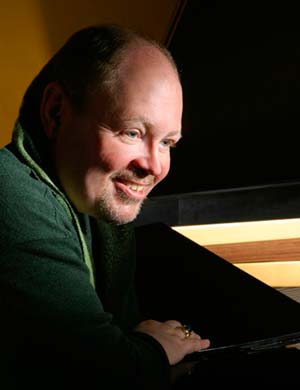
I studied in Urbana for two years, which was an extraordinary time because my classmates were Erie Mills, Eric Halvorson and Jerry Hadley. We were all in the same class! There was a pretty amazing crop of singers there. After two years of living in a place where it snowed about seven months of the year, and when it wasn’t snowing there were tornadoes, and the manure from the farm of the agriculture school blew across campus, I decided it was time to get my ‘tuchus” back to Paris. I wrote to Bernac (Paul, Virgil and John Wustman also wrote him) in the spring of 1976. And he wrote back very sweetly, and said he had a pianist who had played in his studio for decades, so he couldn’t throw her out, but occasionally there would be a lesson when she couldn’t come. So, if I could afford to support myself while I was there, I should come over and we would see what we could do. I moved to Paris! And the first thing that happened was that I got hit by a car in front of the Louvres, and Bernac had a coronary. Needless to say, I recovered much more quickly than he did. But from his hospital bed, he called people like Irène Joachim, Jacques Jansen, Leïla Ben Sevira, Geneviève Touraine (sister of Souzay), and he said, “There’s this young guy who came over to study with me, and I can’t do anything for him for a while, could you use him in your studio?” That’s how that part of my life developed. When Bernac recovered, I started to play in his studio. I went to play a lesson, and another - “Can you come for two hours, can you come for three hours?” That was my first year in Paris.
Also, through Jean-Pierre (Marty), I found lodging on the rue de l’Université, 41: it wasn’t really a “chambre de bonne”, but it was close, in the apartment of Madame la Baronne Martine de Turckheim, who happened to be the mistress of Nathan Milstein….through this connection, suddenly I found myself in a new world of violinists as well. In that same period, through a mutual friend, I had encountered a lady called Miriam Solovieff who was an extraordinary violinist, but an extremely difficult woman. She used to perform as a duo with Julius Katchen. I played a lot in her studio as well and I learned so much more about everything and, of course, about chamber music while playing for Miriam’s students.
MFL: So you played not only a lot of violin music, but also chamber music?!
CR: Yes, I went on tours with Jeunesses Musicales with Emilia Baranovska (who you can find on Facebook, a Bulgarian French cellist who fled Bulgaria and now lives in Berlin). She’s a fabulous musician and a remarkable lady. We’re still in touch a little bit. We played recitals together. One particular recital in Sainte-Marie- aux- Mines in Alsace took place when there was no electricity for thirty-six hours because of an ice storm; we played the Brahms cello sonatas, wearing our top coats and hats in the lobby of the Mairie, with the fireplace going, and about three hundred people in the audience wearing top coats, hats and gloves.
Craig’s First steps into L’Opéra-Comique…
One day, late in the winter of 1977 I got a call asking if I could sub for a pianist at the Comique. There was going to be a La bohème rehearsal the next day on stage, and there was no pianist. It was for the old opera studio under direction of Louis Erlo. Of course, I went off and played it. At the end of the rehearsal, they offered me a job as a coach on the staff of the opera studio for the coming season. Twice, I applied for a full time job at the opera, but you had to play a big solo piece, like a Chopin polonaise, by memory, and I never had a good memory. I later learned that I have various mental things that impair the memory. So I played, but using the music, and was disqualified because of it. Janine Reiss and Hugues Gall were beside themselves that I had been turned down, but that’s what the union rule stated. Nevertheless, Janine, Mr. Lieberman and Mr. Gall used to invite me into the house a little bit on the side to do some work with singers. The opera studio was about to be reorganized - Louis was no longer in charge. I went to the Comique one day to play an audition for an American soprano, Peggy Bouveret. She is a fabulous voice teacher, a great lady from Minnesota. When we walked in, they said, “Ah Monsieur Rutenberg, est-ce que vous connaissez Lulu?” The weekend before, I had been to a party à St-Cloud, where there was a rather well- known drag queen called Lulu… “bien entendu”, and left it at that. I played for Peggy’s audition. We were getting ready to leave and they said, “Alright, here are the first two women who are going to sing Lulu.” They said, “We’re having auditions for Lulu and there’s no other pianist”… I went, “Eheheheh” “there’s no one here, there’s no one else to play, you’ll have to, please.” So… there I went and I sight read “das Lied der Lulu”. During the first woman’s audition, the score fell on the floor, but landed open, I kept playing like a rag time pianist, looking at the score on the floor. I played those two, and got up to leave, and they said, “Merci infiniment Monsieur Rutenberg.” We started to walk away, and one of the stage managers came running after me saying, “Monsieur Rutenberg (2x), ne bougez pas: Monsieur Boulez tient à vous parler.” Boulez had been in the audience along with people from L’IRCAM. Peggy looked at me and said, “That does it: every time you come to play an audition, I get bupkis and you get the job. F… you.” I went back in. L’IRCAM was just starting then; Beaubourg had been completed. They were going to do a season of nine new one-act “operas” the following year, and asked if I would consider being the assistant conductor and coach. Well, how do you say no to Pierre Boulez? It wasn’t my world, but I thought, “I guess it would do me good to learn these pieces.” There was Alexander Goehr, Georges Aperghis, Ligeti, big stuff. Also, by then the opera studio was falling apart … I worked for Boulez, played a lot of recitals. During that time with IRCAM, Nick Snowman, (who was Boulez’s right hand man, and had spent his formative years at Glyndebourne,) invited me for breakfast one Saturday morning to meet Brian Dickie, who was in town. As a result, Brian offered me a very junior position on the music staff at Glyndebourne.
MFL: All the dots are connecting.
CR: All the dots are connecting. I have had the most extraordinary life that way.
MFL: You certainly deserved it too.
CR: Well, I don’t know, but I tried to do the job as well as I could.
MFL: Who were the favorite singers with whom you worked in the opera house, and also in recitals?
CR: Régine Crespin, Alain Vanzo, Nicolai Gedda, Christa Ludwig, Frederica Von Stade, Thomas Hampson, Ben Heppner, Plácido Domingo, Luciano Pavarotti (though he was difficult), José Van Dam, Mirella Freni, Elisabeth Söderström, Hilde Güden…
The first year, I did fall and early winter at The MET, late winter and spring in SF, then Summer at Glyndebourne. The second year I did the fall in San Francisco, most of winter in New York, then before going to Glyndebourne we went on the tour to Japan. One night in Tokyo, Jimmy asked me up to his room, for a vodka on the rocks and a club sandwich. We chatted about our favorite singers. Finally, he said, “Well look, I’d like you to be in charge of the Young Artist Program.” And I thought, do I know enough? Aye aye aye…”Give me a week.” He agreed and I agreed to it.
It was a mistake. I was not emotionally ready for it then. Indeed, I quit two years later. I treated the MET very badly. I regretted that I did that. Nobody deserved the way I walked out. But I became head of the music staff then, and that’s how all that took place. Finally, after two and a half years of dividing everything, Jimmy said, “Okay babe, you’ve got to make up your mind. New York or San Francisco.”
I went with New York. I don’t think Sarah was very happy with me, and I apologized for that, but I couldn’t turn down all that.
Things got difficult, and I left the MET in December 1992. We had no contact for years.
When I left, I was teaching up at Yale, which was a nightmare, not for the students, but for Yale. Richard Pearlman invited me up to Eastman, where I worked for two years. I commuted, but I was up there.
Craig is off to Amsterdam!
After that, I went to the Opera Studio in Amsterdam for two years. Then I started working at the Boston University as well, and then, eventually Elisabeth Söderström and Birgit Nilsson invited me to Stockholm for the Opera Academy there. I was teaching at all these places.
In the meantime, I was playing about twenty-five recitals a year for Hampson, Heppner….and then, in 2006 the phone rang, and I noticed it was the MET. I thought they just wanted cheap advice on a Swedish singer, so I didn’t pick up. But Sarah left a message saying, “It’s very important you ring us straight away, very important.” And I didn’t… the next day, I see it’s the MET again, I don’t pick up, and it’s Sarah saying, “Listen, you’ve been sighted in a restaurant on the East side, you must ring back!” So, I rang back, and it was a very interesting conversation. John Fisher had just left. I know there were a couple of people on the staff who were interested. Sarah said, “I’ve been talking to Jimmy, you’re the only serious candidate who’s come up.” I didn’t believe that. She said, “I think you’re probably a different person than you were in 1992, and Jimmy thinks he’s a different person. It would behoove you to come over and speak with him at least.” And I said, “Well, of course. I’ll be happy to come over and speak. When do you want me?” She said, “Ehm, thirty minutes.” So, I went across to The MET, and we sat down. The crazy thing that had happened is, about two weeks before at Tanglewood (or Boston), walking off after the soloists in Beethoven 9th, which included Christine Brewer, Levine tripped and fell and broke his shoulder.
About ten days after that, after a recital with Christine Brewer at Christian Steiner’s Festival “Tannery Ponds Concerts”, we went to a party, and I missed a step going down into the living room, and fell and dislocated my right shoulder. So, Jimmy and I had our arms in slings and looked like the two twins in The Shining.
We went and talked, and we got along just fine. And I said, “Jimmy, there’s just one thing I have to say, before I even consider this: I’m not a mind reader. You have to tell me what you don’t like and what you want, otherwise, I can’t do the job.” And he said, “Got it.” And he never reneged on that in all those nine years we worked together. I guess I hesitated for about a week. I was at Chautauqua with Marlena and Hilda Harris, and we would be out walking and talking about it, and I would just start crying. I was so unsure. But I thought, “It’s a great opportunity, and I know I’m a different person, and I think I’m a more advanced musician, and maybe I can bite my tongue more than I used to. And if James Levine is making this effort, I should try it.” So, I went back and told him and Peter I would try it for two years. I wanted a two-year contract, and if they didn’t like what I was doing after they could tell me, and I would depart. And if I didn’t like what they were doing I could depart with no repercussions, and that’s all it all started up again.
MFL: You were there for nine years?
CR: I stayed for nine years
MFL: So, the first time you started was in 1986? I am only trying to get all the years organized ☺
CR: I started in 1986. In 1989 I was made head of the Music Staff, and I left in 1992.
MFL: and then you went away and did all these other fun things.
MFL: I am diverging but you are leading me to all kinds of interesting places. I know you were recording Virgil’s music and all that. What came out of that association with him?
CR: Well, he got me out of my Germano-centric mindset. Even though I knew some Debussy and Ravel already, he opened the rest of the world to me. Also, particularly, Poulenc… The other thing was, he introduced me to a world I could have only dreamed of: the world of Bernstein (whom I had already met), Copland, Barber, of actresses, Mildred Natwick, Tammy Grimes for what that’s worth, writers like Nabokov, composers like his brother Nabokov, Boulez. It was extraordinary. It became an important relationship after we cleared up that I would not be his boyfriend. When I went to meet him, I was a very skinny nineteen-year-old, with wavy blond hair and gold glasses, in a three-piece white suit from Britches of Georgetown (which was “the” clothing store in DC.) He looked me up and down and said, “Come on in.” We sat on the couch. He was asking me about my studies. His hand came to my thigh, three times. “Mr. Thomson, that’s not why I am here. I came because after learning your music through Four Saints in Three Acts, I am a huge fan, and I wanted no more. If you’re upset at me or angry, I’ll leave now.” And he said, “Oh for chrissakes,” got up, and walked into another room and slammed the door. I thought, “Well at least I met him!” I started to pick up my things and as I was walking to the door of the apartment at the Chelsea, he came out and said, “I think you better stay: you got class, and, for a kid, you got style. I have to go to Mr. Rorem’s apartment for a little bit, but you stay here. There’s vodka in the freezer. All of those big storage cases you see on top of bookcases are letters from Picasso, Stravinsky and Gertrude and Alice; you may take them down and look at the letters. If anything goes missing, I’ll know where to find you.”
I sat on the floor with the bottle of vodka, perusing letters from these great people of the first half of the century. When he came back, we had dinner downstairs at the restaurant “El Quixote” (it is called that again - the new version is nothing like the old version at all). While we were having dinner, Isabel Gardner, who was a poet and the great niece of Isabella Stewart Gardner, came over and introduced herself and invited us to have a drink after dinner. I kept calling my father and saying, “I’m taking a later train, I’m taking a later train…” My dad was a jeweler who worked in downtown New Haven; Thursday night was a late shopping night in New Haven, so all the stores stayed open until 9PM. He would always bring a special treat on Thursday night. He came home one night with a paperback book of Virgil Thomson’s music criticism and handed it to me. He said, “I remember this name, I think he is very important.” I was probably about ten or eleven when he brought this book home.
MFL: Interesting! How did you get to Paris?
CR: During my four years at Georgetown, I had a roommate who was a French Major, and all this time Paul and Virgil were feeding me more Ravel, Debussy, André Caplet, Henri Sauguet, and a certain amount of Bizet: I was learning the French musical vocabulary and the repertory. As a graduation present from Georgetown, Virgil and a friend of his who was a French professor, Bob Lewis, offered me a trip to Paris. During my undergraduate days I had had two serious boyfriends, one of whom was Jean-Pierre Marty, pianist and conductor, who was then music director of The Washington Opera. I went to Paris for a week, and ended up staying three weeks - in those days you could easily change your ticket without impunity, and I just fell head over heels in love with Paris, as most Americans do. I knew I had to be there for my musical education somehow.
I had already been accepted at Urbana to study with John Wustman. And a friend of a friend, a young baritone called Douglas McCleary, was a student of John’s and had also studied with Bernac. Doug kept saying, “You must go to Paris” (x3). Wustman said, “It seems to me you should probably be studying with Pierre;” and Paul Hume was saying, “You should study with Pierre.” Virgil said, “If you’re going to study with someone, might as well study with the best.”
Click on a photo to see the full version
It is with great pleasure that we introduce to you, Craig Rutenberg, pianist, coach, assistant conductor, prompter and recitalist.
Craig Rutenberg was Head of the Music Staff at The Metropolitan Opera from 1990-1992 and from 2006-2015.
His studies brought him from his native New Haven to Washington DC, where he studied German and Italian at Georgetown University, to Champaign-Urbana, where he studied with John Wustman, and finally to Paris. There he worked with Pierre Bernac, and later with Martin Isepp and Geoffrey Parsons in London.
Craig has been active as a recital pianist and as a coach throughout the United States and Europe, as well as in Scandinavia. After he left the Metropolitan Opera in 2015, he traveled regularly to coach at the Mariinsky Theater until the pandemic.
I had the great pleasure of meeting him at my very first opera contract, where I was playing chorus rehearsals and Master Classes (his being a highlight!) at Santa Fe Opera. I was immediately struck by his incredible knowledge not only of the music, the repertoire and the styles, but also of the voice. His approach was incredibly inspiring. His passionate love of music, literature, art, science, his insatiable intellectual curiosity, and his joie de vivre are contagious.
The following interview was conducted on zoom in two parts in January and February 2023. It should shed some light on who Craig Rutenberg really is, and will take you on his journey!
Marie-France Lefebvre
